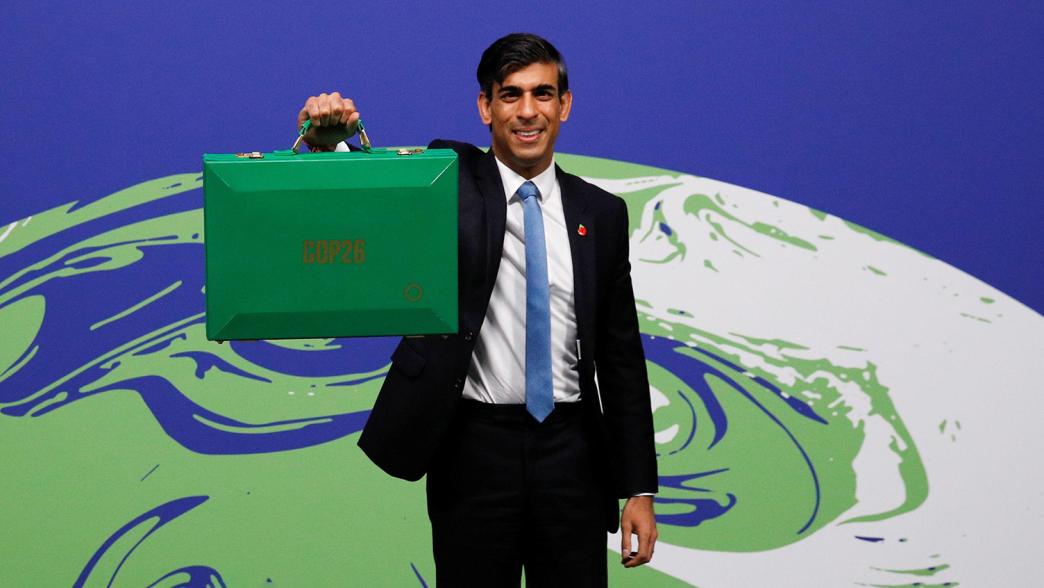Rishi Sunak must champion net zero as prime minister
Rishi Sunak will need to start building on that Glasgow speech sooner rather than later.

Sunak didn’t prioritise climate change as chancellor, but any shift from urgent action will lose him votes at home and credibility abroad, warns Tom Sasse
Just under a year ago, Rishi Sunak gave a well-received speech in Glasgow.[1] The occasion was “Finance Day” at COP26 and the then chancellor described how it would be money and markets that would drive the climate transition, announcing measures to make the City of London a leader.
The speech was notable for two reasons. First, the former investment banker was sure-footed in describing how the UK would lead on the global stage (Boris Johnson book-ended the summit with a rather more chaotic interventions). But second, up to that point, Sunak had been cool on climate: just the week before he had announced a budget which, like his previous one, more or less ignored net zero as a priority.
Fast forward a year and Sunak, now anointed PM, is being criticised for suggesting he won’t attend the follow up summit, which begins in just over a week in Sharm el-Sheikh in Egypt – as well as for sticking with Liz Truss’s decision to advise King Charles not to attend either. Critics see these moves as damaging and ominous.
The prime minister should be going to COP27
No.10 can offer various justifications for Sunak’s non-attendance: he has big challenges to respond to at home – a difficult autumn statement and questions about his home secretary – and on paper this is one of the lesser COPs, unlike the big ones in Paris or Glasgow. Yet none are particularly convincing.
Sunak’s priority may (rightly) be the UK’s economic situation, but the biggest and most pressing challenge the world faces is climate change. Snubbing the event risks making him appear parochial and short-sighted. One of the difficulties of being prime minister is making trade-offs about how to spend your time and the signals you send. Whether to make a short visit to Egypt – also his first opportunity to meet Presidents Biden and Macron since taking over – does not look like a hard one.
A bigger motivation, though, should be showing that diplomatically the UK will not leave the job half-done. Glasgow was a qualified success: a series of headline agreements and innovative side deals (like ending deforestation by 2030 and phasing out of coal in South Africa) added up to more progress than many expected. Yet the broad-brush nature of the deals – and the commitment to change from five yearly to annual reviews of national targets – meant the details were again kicked down the track. The success of the Glasgow Pact was always going to be determined in Sharm el-Sheikh.
Progress since has been minimal, with the energy crisis and Russia’s invasion of Ukraine focussing attention on energy prices and security. But world leaders should be doing everything possible to ensure the crisis leads to a clean energy acceleration, not a fossil retrenchment. For Sunak, aside from showing up, that means giving the UK negotiating team the strongest possible hand. A key test will be whether COP President Alok Sharma can lead from the front on climate finance.
The UK needs a credible plan for reaching net zero
The new prime minister will also be pressed on the UK’s plans at home. The latest figures show the government remains well off track for meeting its carbon budgets in the 2030s – and, thus, its net zero target. The Johnson net zero strategy was good on ambition – such as a 2030 phaseout date for petrol and diesel cars – but short on detail (unlawfully so, the High Court found[2] ). The Sunak government has until March to remedy that.
The politics point towards a shift in approach. While as chancellor Sunak sought to draw a contrast with Johnson’s green-tinged cakeism, as PM he must hold the Johnson coalition together. Polling shows departing from the net zero agenda would be a major vote-loser, while Labour used its conference to announce big moves towards green energy.
But that leaves the question of where the government should focus, with departments braced for cuts. The most obvious starting point would be announcing a national mission to boost energy efficiency and look more widely at ways of reducing energy demand. Alongside redesigning price support to better maintain price signals, this could help provide a path out of the current crisis and towards net zero. Despite being critical to achieving net zero affordably, energy demand was almost entirely ignored in the Johnson plan (though Sunak has talked about it).
A second area is to embed net zero more firmly in government in order to ensure key policy gaps such as land use and buildings are filled. The appointment of Grant Shapps as business secretary to corral efforts – a prominent net zero backer with a good record at transport – is a good sign. As is the fact that Sunak has kept with the wide-ranging Skidmore review. But seizing the benefits of the transition to green industries requires not just a more detailed plan, but rather a much stronger ability within government to coordinate and deliver policies that will enable the transition over the coming decades – as the IfG has long called for.
Sunak may not be jetting off for his first big conference as PM just yet. But he will need to start building on that Glasgow speech sooner rather than later.
- COP26 Finance Day speech - GOV.UK (www.gov.uk)
- High Court deems Government’s Net-Zero Strategy unlawful - edie
- Topic
- Net zero
- Keywords
- Climate change Environment Energy Economy
- Position
- Prime minister
- Administration
- Sunak government
- Department
- Number 10
- Public figures
- Rishi Sunak Alok Sharma
- Publisher
- Institute for Government